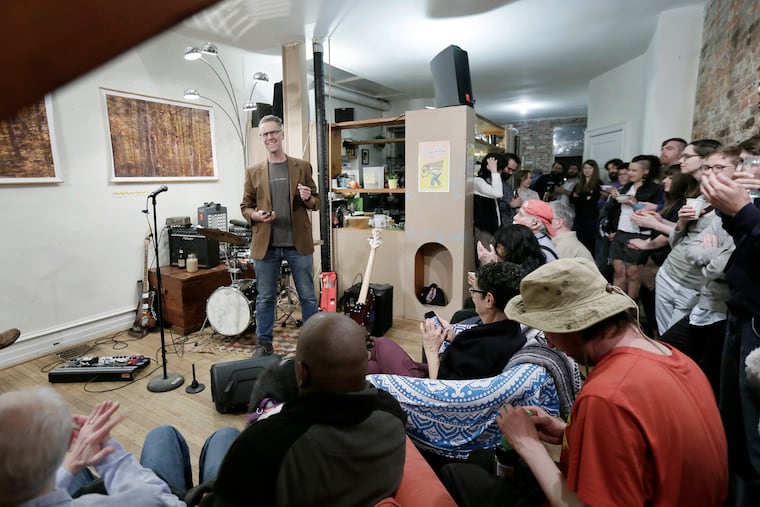Would you open your living room to strangers, six times a year? This man has been doing it for a decade.
You know Jacques-Jean Tiziou as the artist behind the enormous mural that graces the side of the airport parking garage. But West Philly knows him as JJ, the guy who's opened his living room to community concerts for more than a decade.

The most iconic billboard off I-95 in Philadelphia isn’t selling anything. It’s an 85,000 square-foot mural called “How Philly Moves” that wraps around the facade of the parking garage at Philadelphia International Airport and features folks photographed by JJ Tiziou.
But Tiziou has recently hung up his camera. He wants to concentrate more on his lentil soup.
That is, the giant pot of thick, bubbly, burnt-orange stew that dozens of people crowd around six times a year while attending a concert in Tiziou’s living room. For more than a decade, Tiziou, the captain of the 4500 block of Osage Avenue in West Philadelphia, has thrown open the front door of his pseudo-group home to host these events, which he uses to bring together neighbors from every walk of life.
“I want this house to not just be a refuge from the world,” he said, “but a refuge for the world — anyone’s welcome here.”
During the concerts, Tiziou, 40, is a bit like a preacher, sermonizing between sets about community, collegiality, and closeness. He asks attendees to be grateful for one another and to “find beauty around every corner.” In this house, the church is the neighborhood, the prayer is the music — and the religion is belonging.
For him, all three intertwine. On his front porch, for example, hangs a banner advertising a fund-raising campaign for neighbors on the block who were recently driven from their homes when an affordable-housing nonprofit sold their apartment building. That travesty is why Tiziou is doubling down on organizing community events like house concerts and potlucks: “These are things that happen,” he said of the banishment of the apartment dwellers, “when we don’t know our neighbors and can’t advocate for each other.”
Inside the house concert on an unseasonably warm Saturday evening, dozens of guests are side by side in the oversize living room, passing around a plate of sliced ice-cream sandwiches and breaking off chunks of homemade challah brought by a neighbor.
They’re black and white and Asian and Hispanic. There’s an infant strapped to his mother’s chest and a septuagenarian without his shoes on.
Over the years, the series has featured music hand-selected by Tiziou, including folk and rock, ’60s country and funky bluegrass, a hip-hop duo, and a Celtic trio. The set list this time around has three acts: Likebirds, a jazzy local group with a singer who plays the flute; Black Sea Hotel, a Balkan a cappella trio from Brooklyn that was once part of a Grammy-winning collaboration with Yo-Yo Ma; and Eli Conley, a singer-songwriter from the San Francisco Bay area.
Conley has played plenty of house concerts in his day — the intimate venue is perfect for a folk artist whose songs tell stories — but he said Tiziou’s series is among the most established.
“People come to this not for a specific artist. They’re just like, ‘Oh, this is a really wonderful space and I come every time [Tiziou] does it,'" Conley said. “That’s just invaluable as an independent musician — to be able to play in a place where we know there will be an audience who’s excited to listen.”
Dani Gershkoff, the flautist from Likebirds, said she’d so enjoyed attending Tiziou’s house concerts in the past, she asked if her band could play his living room.
“He cares about building a creative community,” she said. "I’m excited to support that.”
The musicians are paid out of whatever attendees throw in a contribution jar. There’s a suggested donation, but Tiziou is hell-bent on also welcoming attendees who have empty wallets and stomachs.
The openness of the house-concert series is a formula Tiziou hopes others will emulate in their homes. Though when the music is flowing and he’s acting as the show’s emcee, it’s easy to forget he doesn’t own the house — though he hopes to one day — and has been renting it for more than a decade.
Still, he has created not just a community sanctuary, but a place in which he and his housemates (there are currently three; there have been many more over the years) feel like they’re members of not only the community inside the house, but the ecosystem that is this one city block. The concerts are the cornerstone.
“When all of my memories of living here come back to me,” said housemate Pablo Baeza, 28, “I will smell and taste the lentil soup in my mind.”
Making that soup, moving the living-room furniture, getting the dishes ready, and escorting the musicians around is a time-consuming endeavor. Tiziou has recently learned to ask for help from friends and neighbors, something he says he long felt uncomfortable doing — probably because working primarily as a documentary photographer makes for a pretty solitary work life.
That’s part of why he’s retiring from it. For him, photography was never really about the craft or the digital practice. It was a tool to connect with others and represent people he saw as excluded — like the 200 Philadelphians of many races, ages and lifestyles featured in “How Philly Moves,” the parking garage mural, and its companion exhibition near the airport baggage claim.
Tiziou knows the photography, like his house concerts and potlucks, can’t represent everyone. The power instead is in creating a sense of togetherness — to make something where everyone can see themselves fit in.
“What it’s all about,” he said, “is when you see them all side by side.”